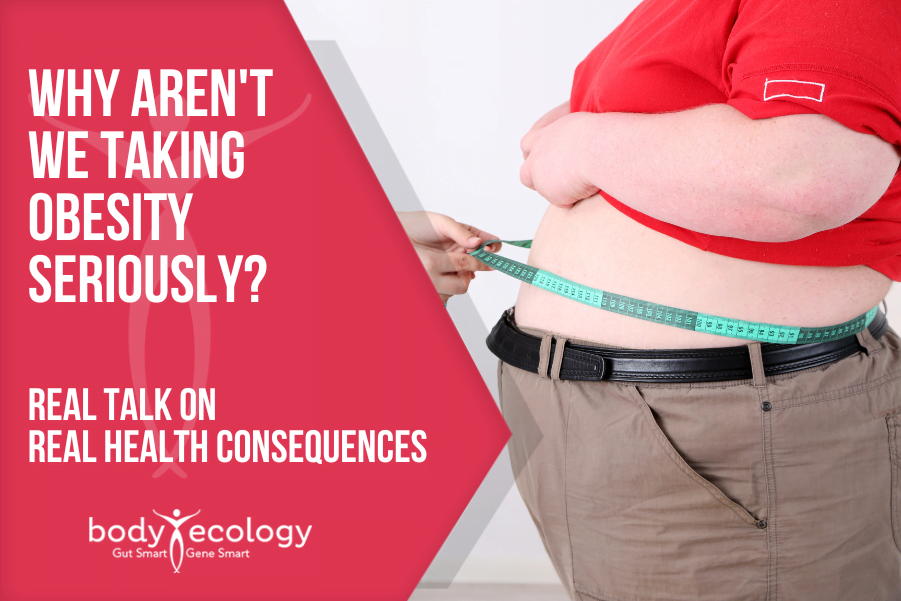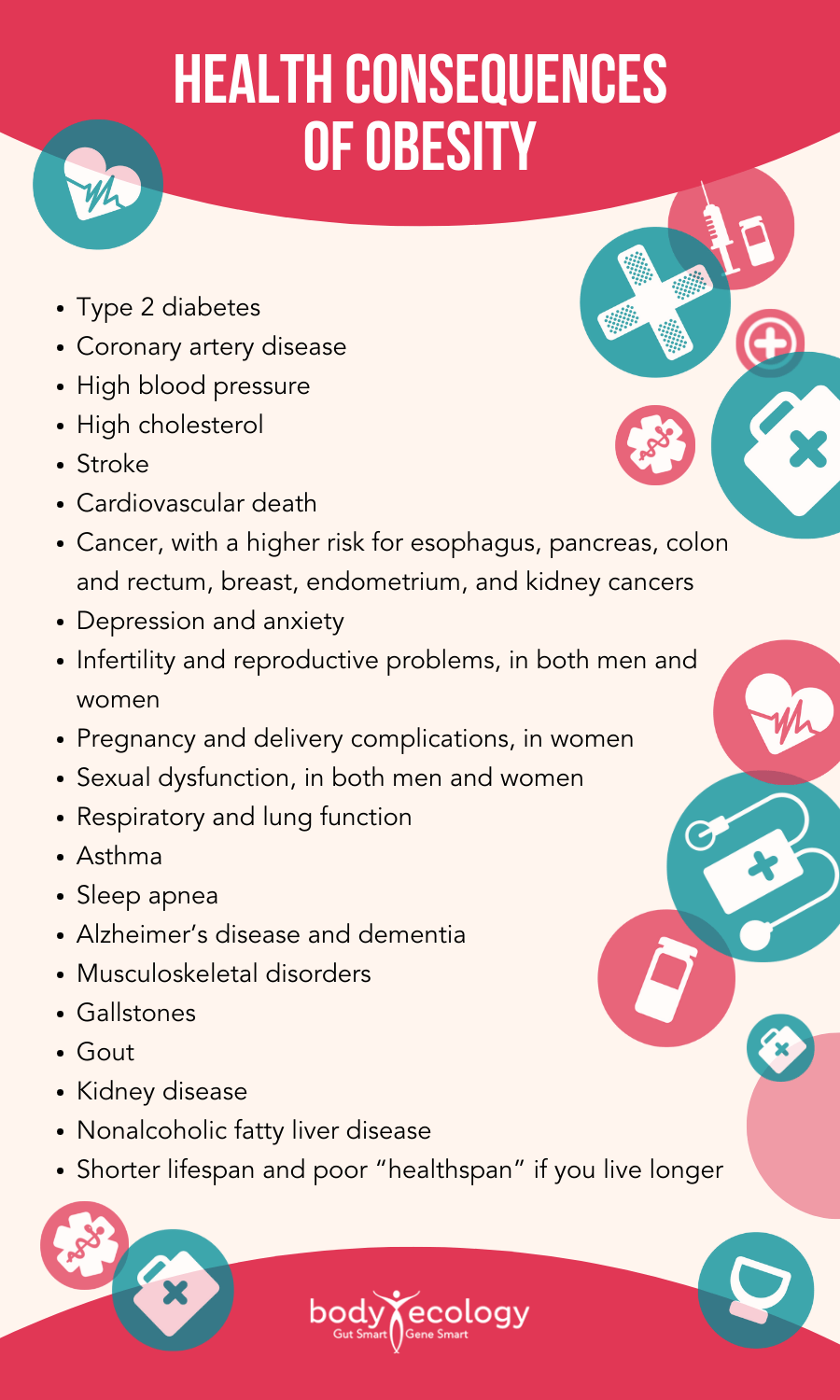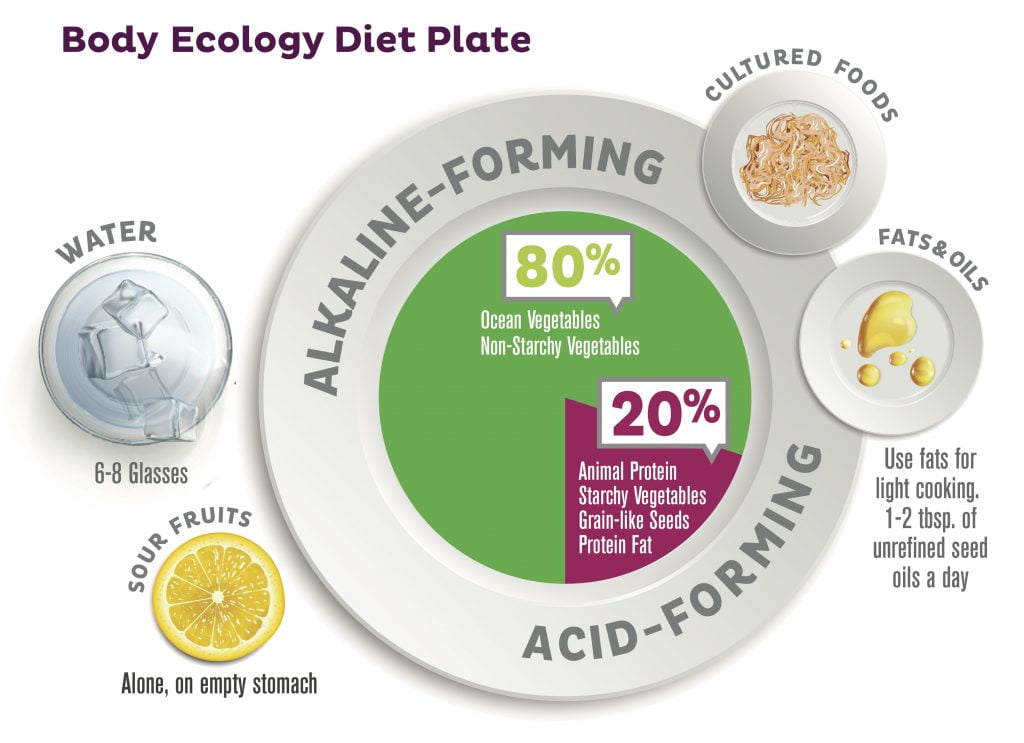Why Has Obesity Become Acceptable In America?

Let me start this article by saying I understand this topic is sensitive. It’s also something I don’t talk about often. That’s because Body Ecology has never been touted as a weight loss diet. In fact, It’s a way of life—much more than a “diet.” When properly followed, weight loss is a natural side effect of the BE Way.
Last week we talked about the topic of food combining. When you combine foods properly, you digest food better, absorb more nutrients, eliminate gas and bloating, gain more energy, and ultimately lose weight naturally. However, the Standard American Diet (SAD) of burgers and fries, steak and potatoes, and eggs and toast defies every rule of food combining. And it’s one of the primary reasons that we, as a nation, have become so obese and disease-prone. No wonder so many people “catch” Covid and the most vulnerable have a more severe outcome.
In the past couple of decades, there has been a significant shift in our culture around body image. We went from unhealthily slim models in the 90s as the accepted norm, to accepting obesity as part of today’s ‘body positivity’ movement.
However, science and medicine tell us that obesity is unhealthy.² Just as science and medicine told us that starving ourselves to be skinny in the 90s was unhealthy.
It’s upsetting to me that anything harmful has become acceptable in our society—culturally normal.
So I want to take a few minutes to acknowledge these challenges head on, and explain how some of Body Ecology’s principles can help anyone on their journey to better health.
Obesity In America
The CDC warns that obesity is a “common, serious, and costly disease.”¹ They don’t define obesity as a condition, illness, or health concern, but rather a disease. That in itself should be alarming. Unfortunately, it’s had the opposite effect. Because it’s defined as a disease, obesity is often defended as something that can’t be controlled.
In all, more than 73% of Americans are either overweight or obese.¹ That’s nearly three-quarters of our 334MM population! The list of diseases and health conditions either caused by or related to obesity is exhaustive. Many are deadly or debilitating, which is why it is so disturbing that obesity is not being treated as the serious health epidemic that it is.

While it’s common to hear arguments that obesity is hereditary or genetic, genome-wide association studies have found that while there are genes associated with obesity, they remain silent when they are not being expressed and have a very small affect.³ Certain medications, hormonal changes, stress, lack of exercise, poor sleep and of course, diet, contribute to obesity. While these factors have all been shown to have an impact on weight, it’s simply not enough to explain the number of our population that are obese.
Did Your Family Think A Healthy Diet was Important?
The beliefs we form early in life around food affect our weight and are contributing to the obesity epidemic. Most people tend to eat like their parents did. When nutritious foods are not a priority in a home, children grow up believing you can eat whatever they want and choose junk foods.
When parents hold nutritious foods in high esteem, their children grow up believing this too. Start teaching them this when they are very young. Children can go shopping and learn what foods are best and help with preparation at home. They can grow them-—even in garden containers—and feel pride in growing what they eat. Strange, but somehow, rather magically, they taste much better too.
On the other hand, it’s hard for a parent to feed their own child well and send them out into the world where they see everyone else eating junk food. This is why teaching children to be proud of this family value is wise. And to even feel sad that others don’t know the importance of eating well. Next thing you know, they become little teachers too.
I personally have noticed that in a two-parent home, if mom cares, but dad does not, the children almost invariably choose dad’s way. Dads don’t realize how important their role is in establishing values in their children, especially around food.
Obesity can also be a protection. A child who is bullied or abused can form an early unconscious belief like, “When I grow up and am big, I’ll be safe. No one will hurt me then.” Sadly, I have known women who deliberately gained weight to make themselves unattractive to men. These women were all victims of sexual abuse as children. I wish that more therapists knew this.
Junk Foods Are Enticing
SAD food is delicious. It’s greasy, salty, and sweet. It signals happiness and pleasure in our brains — but only for a short while before digestive distress kicks in. But the taste and feelings of happiness when we eat junk food is enough to keep going back for more, even when we know it’s not good for us. Cravings overrule logic. Many people turn to ice cream and pizza when they’re sad, anxious, or depressed. Emotional eating is a vicious cycle of chasing a temporary high then feeling really down, and this can be a very difficult cycle to break.
Food really can be ADDICTIVE. That is something we have to acknowledge and understand that food can have a powerful control over our brain and behavior.
But just as with drugs and alcohol, there are ways to detox and get the toxic foods out of our bodies and replace them with nourishing food that supports weight loss, a balanced inner ecosystem, immunity and even the epidemic of depression.
Overcoming Food Addictions With Body Ecology Principles
When it comes to anything with sugar in it, the bottom line is just don’t do it. This won’t be easy. You’ll have constant cravings for something sweet for about four days. When removing sugar and junk food from your diet, expect to feel worse at first. It’s normal to feel anxious, nervous and jumpy—most likely grumpy, too— snapping at anyone around you. But one thing is certain: no one who has eliminated sugar from their diet regrets it.
 Drink plenty of water with lemon juice and add BE Sweet to your liking. It will help your cravings, and your taste buds won’t know the difference. Your brain will think you just had something sweet.
Drink plenty of water with lemon juice and add BE Sweet to your liking. It will help your cravings, and your taste buds won’t know the difference. Your brain will think you just had something sweet.
When we eat something sweet we instinctively want something salty. This is the Principle of Balance at work. Sweet and Salty are on opposite ends. Notice when you eat a super sweet piece of pie you’ll soon be reaching for that bag of salty potato chips. Sugar is expansive and salt is contracting. Sugar is quickly absorbed into the bloodstream, making you feel temporarily open and relaxed (that sugar ‘high’), But It also feeds yeast and other pathogens and makes us acidic. Acid and Alkaline is another one of the 7 Body Ecology Principles.
Eliminating sugar reduces headaches, fatigue, brain fog, nausea, digestive distress, and many of the symptoms that sugar causes. Best of all, eliminating sugar also makes many food ‘cravings’ disappear — even for savory foods like pizza and potato chips.
As you detox from junk food, it’s important to replace it with more nutritious foods that nourish your body, brain, and gut. Fermented foods and probiotic liquids are truly the shining stars of the Body Ecology system of health and healing. They repopulate your digestive system with the beneficial bacteria needed to help digest food, improve nutrient absorption, and support immunity. They’re the key to resetting your body and preparing it for better food choices.
When you do choose what food to eat, follow the Body Ecology 80/20 Principle. That is, fill your plate with 20% protein OR starchy vegetables, and 80% ocean vegetables or non-starchy vegetables. We also use the 80/20 rule to control the amount of food we eat. That is, stop eating when you’re about 80% full. This leaves room in your stomach to aid with digestion and ensures you never feel uncomfortably full and ‘stuffed.’

Finally, the Body Ecology Principles of Uniqueness and Step-by-Step reminds us that each of us is very special. Each of us is an experiment of one, and for that reason, you may need to modify certain elements of any diet or lifestyle to suit your own individual needs. Remember too, that any time you’re beginning a new journey toward better health, you have to take it one step at a time. Starting a new program requires that you create new habits and ditch the old ones—which can be challenging! You cannot expect instant healing and weight loss, but continue the journey one step at a time and focus on creating that foundation everybody needs to support optimal, long-term health.
References
1 https://www.cdc.gov/nchs/fastats/obesity-overweight.htm
2 https://www.hsph.harvard.edu/obesity-prevention-source/obesity-consequences/health-effects









